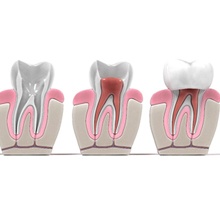Root Canal Therapy – Westfield, NJ
Don’t Be Afraid to Save Your Tooth

When you hear the words “root canal therapy”, do you imagine a painful treatment? In reality, the actual procedure is nowhere near as uncomfortable as you might imagine, especially when it’s being performed by a caring dental expert like Dr. Weinman. In fact, at the end of the treatment, you’ll find that the pain caused by a dental infection is gone, and you can look forward to keeping your tooth for many more years. If you think that you might need root canal therapy in the near future, reach out to our office today to schedule an appointment.
What is Root Canal Therapy and its Signs

Tooth decay grows worse and worse the longer it goes unaddressed. Early on, it may be possible to simply remove the decayed area and replace it with a filling. But once the bacteria have reached the pulp (which contains all of the tooth’s blood vessels and nerve endings), root canal therapy needs to be performed before the damage has a chance to spread any further. Warning signs that you might need a root canal include:
- Visible cracks in the tooth that could allow bacteria to enter.
- Extensive tooth decay that was never treated.
- A damaged or lost crown or filling that wasn’t replaced in a timely manner.
- A tooth that has become sensitive to hot and cold temperatures.
- Recurring severe pain whenever you bite down or chew on something.
- Pimple-like bumps known as abscesses forming on the gums.
- Visible darkening or swelling of the gum tissue.
The Root Canal Procedure

First an X-ray of the tooth is taken to confirm the presence of an infection and to take note of the tooth’s inner structure. Once the treatment begins, the tooth is numbed, and a protective sheet is placed around it to protect it from your saliva. A small opening is made in the crown of the tooth. Special instruments are then inserted to carefully remove the pulp from the chamber and thoroughly clean the tooth’s root canals.
Once we’re sure that the tooth has been completely sterilized, we’ll need to fill it with a biocompatible material before resealing it. Also, your tooth will most likely require a crown in order to continue functioning properly. Depending on the situation, you might receive the crown on the same day as the root canal treatment, or you might need to return to our office for a follow-up visit.
Benefits of Root Canal Therapy

- Stop Your Pain: Once the source of the infection has been removed, the pain in your tooth will stop. Any discomfort that you experience after the procedure should fade within a few days.
- A Comfortable Treatment: Since your mouth will be numbed and sedation will be used as appropriate, you’ll experience no pain during your root canal therapy.
- Save Your Tooth: Your tooth can survive without the pulp. Once the crown has been placed, you can keep eating the foods you enjoy without worrying about further dental damage.
- Long-Lasting Results: As long as you practice good oral hygiene, the effects of root canal therapy will last a lifetime.
Understanding the Cost of Root Canals

During the initial appointment, the question of “How much does root canal treatment cost?” inevitably comes up. Don’t worry – we’re here to help you navigate the financial side of your care as well! After creating your custom treatment plan, we will provide you with a price estimate and review all of the ways to make this tooth-saving service more affordable. Of course, if you want to learn more about the cost of root canal treatment before then, you can also read on.
Factors That Can Affect Root Canal Cost

There isn’t just one factor we need to consider; there are several! The first is the location of the tooth since your molars have a more complex anatomy. We also need to factor in the cost of your restoration as well as the complexity of your case. As we mentioned above, we will be as transparent as possible about the price upfront so there aren’t any unpleasant surprises when it comes time to pay.
Is it Cheaper to Pull My Tooth?

There is a common misconception that it’s cheaper to have your tooth extracted. However, that’s not usually the case. After all, that involves filling the gap with a dental bridge, dental implant, or another tooth-replacement option, which isn’t included in the cost of a tooth extraction. Furthermore, we only recommend removing a severely decayed or damaged tooth when there are no other options. In other words, we want to save your tooth with root canal therapy because it’s the best choice for your oral health and your wallet!
Does Dental Insurance Cover Root Canal Treatment?

Sometimes dental insurance providers do cover some of the cost, like a portion of the restoration needed to protect your tooth. However, the fine print on plans varies, which is why we always encourage our patients to spend some time getting familiar with their coverage. If you have any questions along the way, you can always reach out to us. We can help make utilizing your available benefits easy – we’ll even file the claims on your behalf!
Other Options for Making Root Canal Treatment Affordable

In addition to welcoming dental insurance, our team at New Haven Dental Group is happy to accept Essential Dental Plan and CareCredit. While Essential Dental Plan helps you save on preventive and restorative care, CareCredit allows you to space-out your payments into manageable monthly chunks. To learn more about these financial solutions, give us a call – we’re here to help!
Root Canal FAQs

Our team will take the time to explain the root canal process to make sure that you understand what you’re committing to. Naturally, if you have any questions regarding the procedure or anything related to it, we’ll be more than happy to listen. Here are some examples of root canal questions that we have heard from a number of patients. Don’t hesitate to reach out to us if the answers you’re looking for aren’t on this page.
What Should I Do Before a Root Canal Treatment?
You may or may not need to fast before your root canal treatment; it depends on whether sedation will be used. Patients who don’t plan on being sedated may want to eat something two hours before their treatment.
It may be a good idea to take ibuprofen – or another type of painkiller – right before your appointment. That way, when the local anesthetic in your mouth starts to wear off, there won’t be as much discomfort to worry about.
Make sure you get plenty of sleep before and after your root canal procedure. Sleep helps ensure that your immune system is functioning properly, which is important for recovery.
How Long Does a Root Canal Take?
A root canal treatment typically takes around 30 to 90 minutes. Some teeth may take longer to treat than others based on where they’re located; for example, the teeth in the back of your mouth (also known as the molars) tend to require longer procedures due to the number of root canals that need to be cleaned.
While a root canal treatment normally only requires one visit, sometimes two appointments might be required. During the first visit, some antibacterial medicine may be used; this helps manage your discomfort until the second part of the treatment can be carried out.
Are Root Canals Painful?
The goal of a root canal treatment is to get rid of the infection that’s causing your toothache. In other words, the procedure is intended to help relieve pain, not cause it. Naturally, our team will make sure your mouth has been sufficiently numbed before proceeding with your root canal.
After the procedure, it’s normal to experience some soreness and sensitivity; it’s recommended that you take over-the-counter pain medication while your mouth is recovering. Get in touch with us immediately if your pain seems to be growing more severe even after three days have passed.
Why Do I Need a Root Canal if My Tooth Doesn’t Hurt?
A lack of pain doesn’t necessarily mean that there’s nothing wrong with the tooth. Sometimes an infection can kill the nerve of the tooth altogether. This prevents you from registering pain in the tooth in question, but the infection will still be present and could potentially spread.
Even if an infected tooth isn’t causing you pain, your dentist may still be able to identify the problem during a routine checkup and cleaning. This is just one of many reasons why you should always make sure that you’re scheduling at least two dental appointments every year.
